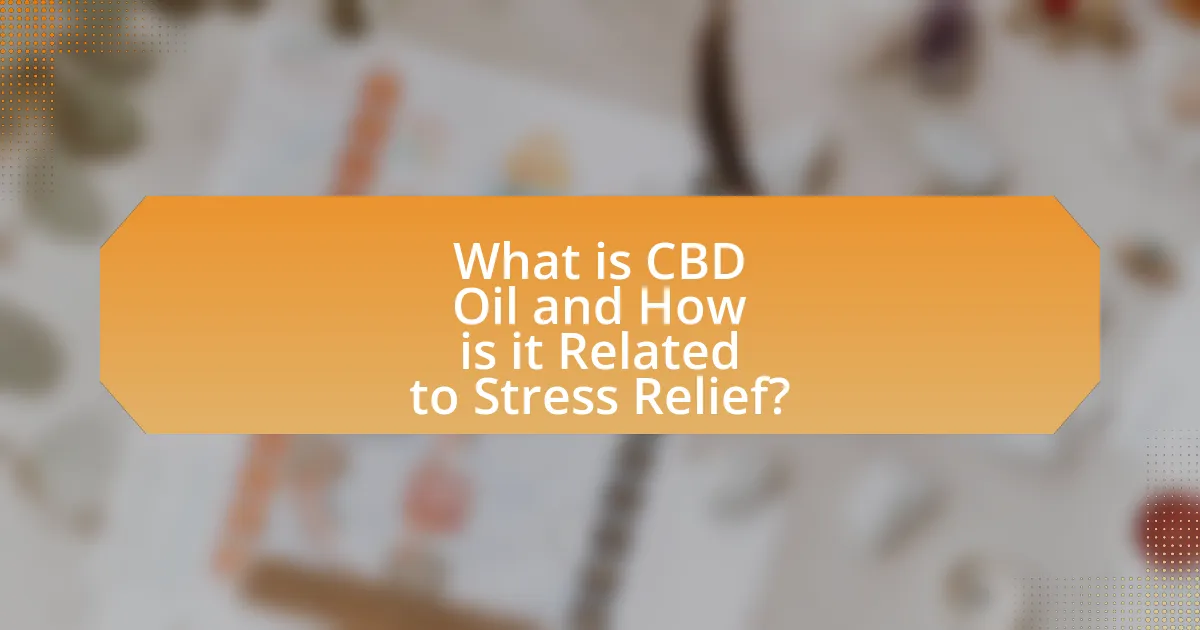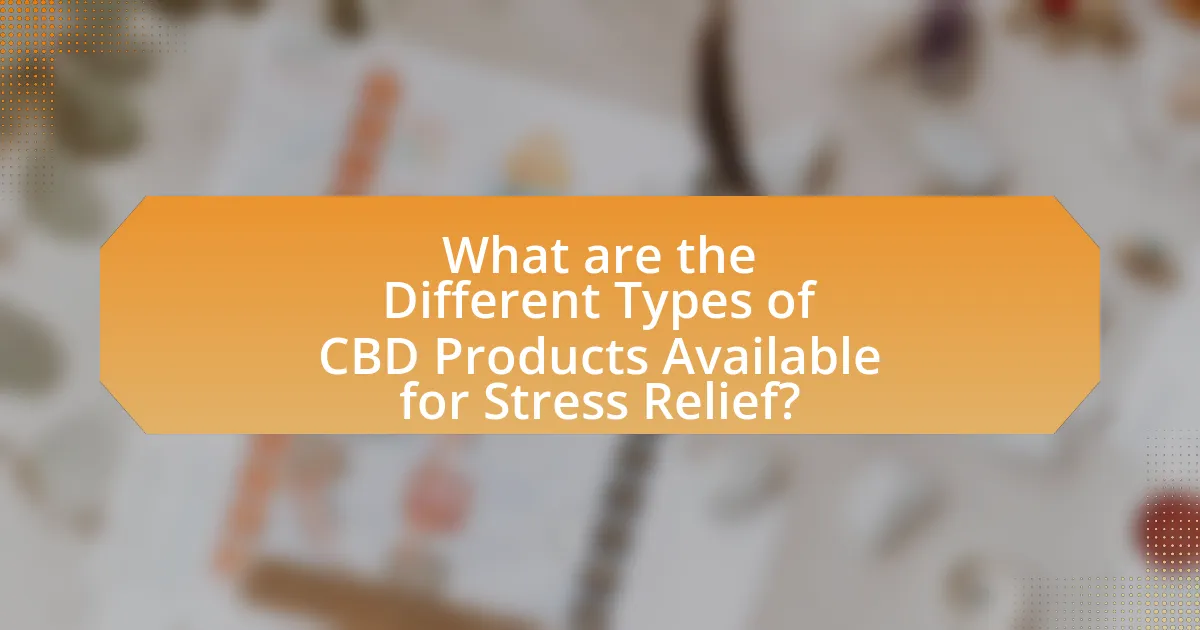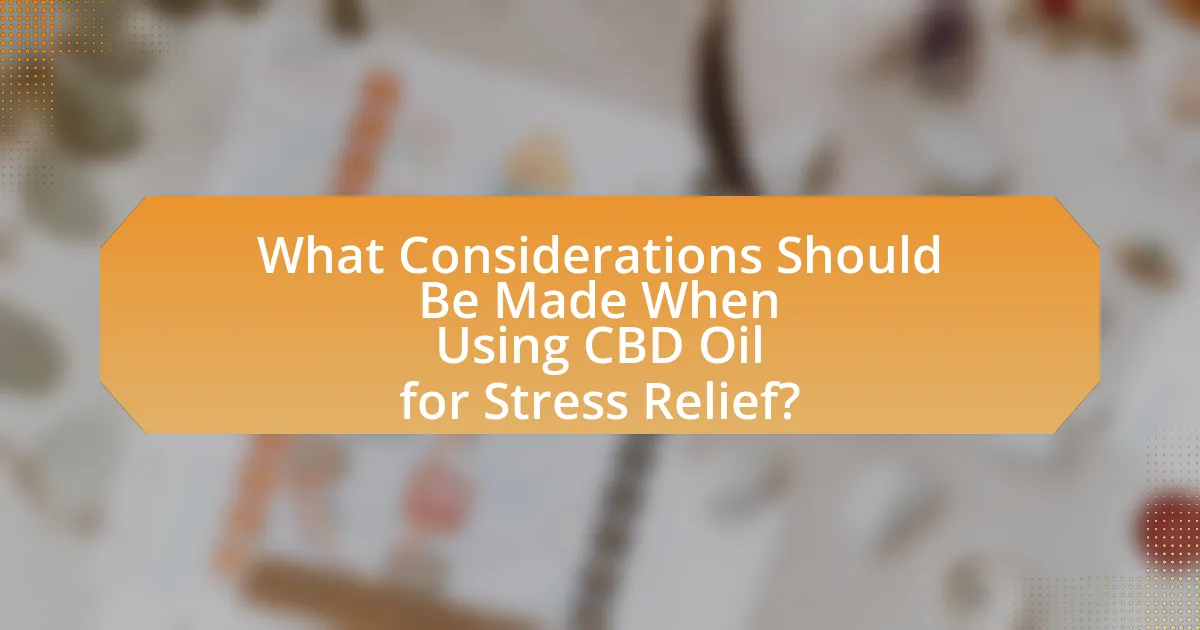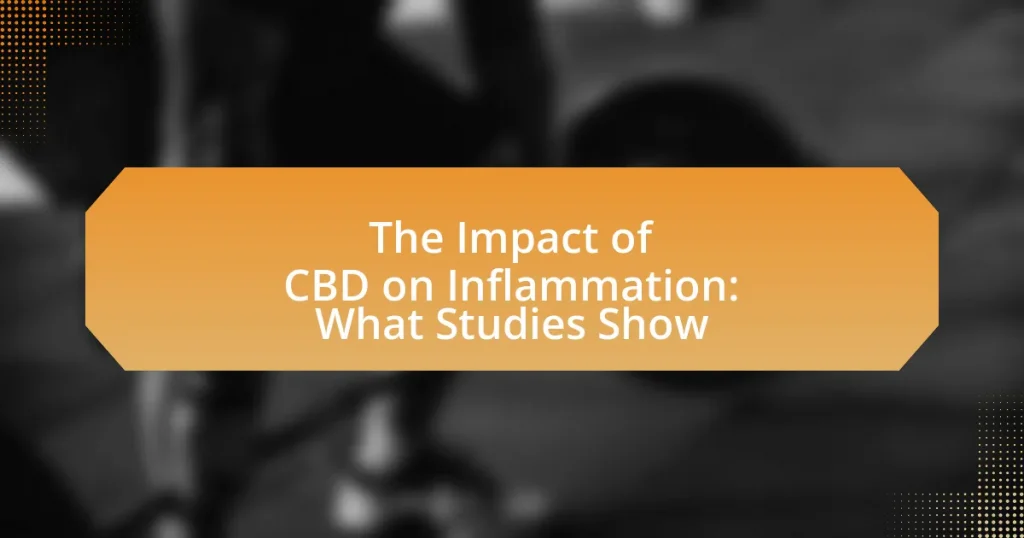CBD oil, derived from the cannabis plant and containing cannabidiol, is recognized for its potential therapeutic effects, particularly in stress relief. Research indicates that CBD interacts with the body’s endocannabinoid system, helping to regulate mood and stress responses, which may lead to reduced anxiety and improved relaxation. The article explores various extraction methods of CBD oil, its key components, and the physiological effects it has on stress management. Additionally, it discusses the different types of CBD products available, recommended dosages, potential side effects, and legal considerations, providing a comprehensive overview of how CBD oil can be effectively utilized for stress relief.

What is CBD Oil and How is it Related to Stress Relief?
CBD oil is a product derived from the cannabis plant that contains cannabidiol, a compound known for its potential therapeutic effects. Research indicates that CBD oil may help alleviate stress by interacting with the body’s endocannabinoid system, which plays a role in regulating mood and stress responses. A study published in the Journal of Psychopharmacology found that CBD can reduce anxiety in both animal and human models, suggesting its efficacy in promoting relaxation and reducing stress levels.
How is CBD Oil extracted and produced?
CBD oil is extracted primarily through methods such as CO2 extraction, ethanol extraction, and olive oil extraction. CO2 extraction involves using pressurized carbon dioxide to pull cannabinoids and terpenes from the hemp plant, resulting in a pure and potent oil. Ethanol extraction uses high-proof alcohol to dissolve the plant material, which is then evaporated to leave behind the concentrated oil. Olive oil extraction is a simpler method where olive oil is heated with the plant material, allowing the cannabinoids to infuse into the oil. Each method has its advantages, with CO2 extraction being the most efficient and widely used in commercial production due to its ability to preserve the integrity of the cannabinoids and terpenes.
What are the different methods of CBD extraction?
The different methods of CBD extraction include CO2 extraction, ethanol extraction, oil extraction, and hydrocarbon extraction. CO2 extraction is widely regarded as the most efficient and safest method, utilizing pressurized carbon dioxide to isolate cannabinoids while preserving their purity and potency. Ethanol extraction employs high-proof alcohol to extract CBD, effectively dissolving cannabinoids but requiring careful purification to remove residual solvents. Oil extraction involves using carrier oils, such as olive or coconut oil, to extract CBD, resulting in a less concentrated product. Hydrocarbon extraction uses solvents like butane or propane, which can yield high-quality extracts but poses safety risks due to flammability and the need for thorough purging of residual solvents. Each method has its advantages and disadvantages, influencing the quality and characteristics of the final CBD product.
What are the key components of CBD Oil?
The key components of CBD oil are cannabidiol (CBD), carrier oils, and terpenes. Cannabidiol is the primary active compound derived from the cannabis plant, known for its therapeutic effects, including stress relief. Carrier oils, such as hemp seed oil or coconut oil, are used to dilute CBD for easier consumption and absorption. Terpenes are aromatic compounds found in cannabis that may enhance the effects of CBD through the entourage effect, which suggests that the combination of cannabinoids and terpenes can produce greater benefits than isolated compounds alone.
What role does CBD play in the body?
CBD, or cannabidiol, interacts with the body’s endocannabinoid system, which plays a crucial role in regulating various physiological processes such as mood, pain sensation, and stress response. This interaction can help modulate anxiety and stress levels, providing a calming effect. Research indicates that CBD may reduce anxiety by influencing serotonin receptors in the brain, as demonstrated in a study published in the Journal of Psychopharmacology, which found that CBD significantly decreased anxiety in participants during public speaking tasks.
How does CBD interact with the endocannabinoid system?
CBD interacts with the endocannabinoid system by binding to cannabinoid receptors, primarily CB1 and CB2, which are distributed throughout the body. This interaction modulates various physiological processes, including mood, pain sensation, and stress response. Research indicates that CBD does not bind directly to these receptors but influences them indirectly, enhancing the body’s own endocannabinoids, such as anandamide, which can lead to reduced anxiety and improved stress management. A study published in the Journal of Psychopharmacology by Blessing et al. (2015) supports this, showing that CBD has anxiolytic effects, suggesting its potential for stress relief through endocannabinoid system modulation.
What are the physiological effects of CBD on stress?
CBD has been shown to reduce physiological stress responses by modulating the endocannabinoid system, which plays a crucial role in maintaining homeostasis. Research indicates that CBD can lower cortisol levels, a hormone associated with stress, thereby promoting a sense of calm. A study published in the Journal of Psychopharmacology found that participants who consumed CBD experienced a significant reduction in anxiety and stress-related symptoms, demonstrating its potential to influence physiological stress markers. Additionally, CBD’s interaction with serotonin receptors may enhance mood and alleviate stress, further supporting its role in stress management.
What are the potential benefits of using CBD Oil for stress relief?
CBD oil may provide significant benefits for stress relief by interacting with the body’s endocannabinoid system, which plays a crucial role in regulating mood and stress responses. Research indicates that CBD can reduce anxiety levels, as evidenced by a study published in the Journal of Psychopharmacology, where participants reported lower anxiety after taking CBD before public speaking. Additionally, CBD has been shown to promote relaxation and improve sleep quality, further contributing to stress reduction. A review in the journal Frontiers in Psychology highlighted that CBD’s anxiolytic effects can help manage stress-related disorders, making it a promising option for individuals seeking natural stress relief solutions.
How does CBD Oil help reduce anxiety levels?
CBD oil helps reduce anxiety levels by interacting with the body’s endocannabinoid system, which plays a crucial role in regulating mood and stress responses. Research indicates that CBD may enhance serotonin signaling in the brain, similar to how selective serotonin reuptake inhibitors (SSRIs) function, thereby promoting a sense of calm and reducing feelings of anxiety. A study published in the Journal of Psychopharmacology found that participants who received CBD experienced significantly reduced anxiety during public speaking tasks, demonstrating its potential effectiveness in real-world situations.
What evidence supports the use of CBD Oil for stress management?
Evidence supporting the use of CBD oil for stress management includes various studies demonstrating its anxiolytic effects. For instance, a study published in the Journal of Psychopharmacology in 2011 found that CBD significantly reduced anxiety during public speaking tasks in individuals with social anxiety disorder. Additionally, a 2019 review in the journal Frontiers in Psychology analyzed multiple studies and concluded that CBD has potential as a treatment for anxiety-related disorders, highlighting its ability to modulate serotonin receptors, which are crucial in regulating mood and anxiety. These findings collectively indicate that CBD oil may be effective in managing stress and anxiety.

What are the Different Types of CBD Products Available for Stress Relief?
The different types of CBD products available for stress relief include CBD oil, CBD capsules, CBD edibles, CBD topicals, and CBD vapes. CBD oil is often used sublingually for quick absorption and effects, while capsules provide a convenient, pre-measured dosage. Edibles, such as gummies, offer a tasty way to consume CBD, though they may take longer to take effect. Topicals, like creams and balms, are applied directly to the skin for localized relief, and vapes allow for rapid delivery of CBD into the bloodstream. Research indicates that CBD may help reduce anxiety and stress levels, supporting its use in these various forms for stress relief.
What forms of CBD products can be used for stress relief?
CBD products that can be used for stress relief include oils, capsules, edibles, and topicals. CBD oil is often taken sublingually for quick absorption, while capsules provide a convenient, pre-measured dose. Edibles, such as gummies, offer a tasty alternative, and topicals can be applied directly to the skin for localized relief. Research indicates that CBD may help reduce anxiety and improve mood, supporting its use in stress management. A study published in the Journal of Clinical Psychology found that CBD significantly reduced anxiety levels in participants, reinforcing its effectiveness as a stress relief option.
How do tinctures differ from capsules in terms of stress relief?
Tinctures differ from capsules in terms of stress relief primarily in their absorption rates and onset times. Tinctures, which are liquid extracts taken sublingually, allow for faster absorption into the bloodstream, typically resulting in quicker relief from stress symptoms, often within 15 to 30 minutes. In contrast, capsules must be digested before the active ingredients are released, leading to a delayed onset of effects, usually taking 30 minutes to 2 hours. This difference in delivery method is supported by pharmacokinetic studies that show sublingual administration provides higher bioavailability compared to oral ingestion, enhancing the efficacy of tinctures for immediate stress relief.
What are the advantages of using CBD topicals for stress relief?
CBD topicals offer localized relief from stress by interacting with cannabinoid receptors in the skin, which can help reduce anxiety and promote relaxation. These products provide a non-invasive method to alleviate stress without the psychoactive effects associated with other forms of CBD. Studies indicate that CBD can modulate the body’s stress response, potentially lowering cortisol levels, which is a hormone linked to stress. Additionally, the soothing properties of CBD topicals can enhance the overall experience of relaxation, making them a practical choice for individuals seeking stress relief through topical application.
How do dosage and administration affect the effectiveness of CBD Oil?
Dosage and administration significantly influence the effectiveness of CBD oil, as the right amount and method of intake can enhance its therapeutic benefits. Research indicates that optimal dosing varies among individuals due to factors such as body weight, metabolism, and the severity of the condition being treated. For instance, a study published in the journal “Cannabis and Cannabinoid Research” found that lower doses may be effective for anxiety relief, while higher doses might be necessary for chronic pain management. Additionally, the method of administration—whether sublingual, topical, or ingested—affects the bioavailability of CBD, with sublingual administration often providing faster and more potent effects due to direct absorption into the bloodstream. Thus, both dosage and administration are critical in maximizing the therapeutic potential of CBD oil for stress relief.
What is the recommended dosage for stress relief?
The recommended dosage of CBD oil for stress relief typically ranges from 10 to 30 mg per day, depending on individual factors such as body weight, metabolism, and the severity of stress. Research indicates that starting with a lower dose and gradually increasing it can help individuals find their optimal dosage. A study published in the Journal of Psychopharmacology found that doses of 300 mg of CBD significantly reduced anxiety in participants, demonstrating the efficacy of CBD in managing stress-related symptoms.
How does the method of administration impact the onset of effects?
The method of administration significantly impacts the onset of effects of CBD oil. Different routes, such as oral ingestion, sublingual application, and inhalation, lead to varying absorption rates and times for effects to manifest. For instance, inhalation provides rapid onset within minutes due to direct absorption into the bloodstream through the lungs, while oral ingestion may take 30 minutes to 2 hours for effects to be felt, as it must first pass through the digestive system. This difference is supported by pharmacokinetic studies that show inhaled substances reach peak plasma concentrations much faster than those taken orally, highlighting the importance of administration method in determining how quickly relief from stress can be experienced.

What Considerations Should Be Made When Using CBD Oil for Stress Relief?
When using CBD oil for stress relief, it is essential to consider dosage, product quality, and individual health conditions. Proper dosage is crucial, as effects can vary significantly; studies suggest starting with a low dose and gradually increasing it until the desired effect is achieved. Product quality matters because not all CBD oils are created equal; selecting products that are third-party tested ensures purity and potency, which is supported by research indicating that contaminants can affect efficacy. Additionally, individual health conditions, such as existing medications or medical issues, should be evaluated, as CBD can interact with certain drugs, potentially leading to adverse effects.
What are the potential side effects of CBD Oil?
The potential side effects of CBD oil include fatigue, diarrhea, changes in appetite, and weight fluctuations. Research indicates that these side effects are generally mild and often resolve on their own. A study published in the journal “Cannabis and Cannabinoid Research” found that while CBD is well-tolerated, some users reported these adverse effects, particularly at higher doses. Additionally, CBD can interact with certain medications, which may lead to further complications.
How can one mitigate the side effects of CBD Oil?
To mitigate the side effects of CBD oil, one can start by adjusting the dosage, as lower doses are often associated with fewer side effects. Research indicates that individual responses to CBD can vary significantly, so finding the optimal dose through gradual adjustments can help minimize adverse effects. Additionally, taking CBD oil with food may enhance absorption and reduce gastrointestinal discomfort, a common side effect. A study published in the Journal of Clinical Medicine found that co-administration of CBD with food increased its bioavailability, which can lead to more effective dosing and potentially fewer side effects. Staying hydrated and monitoring for any adverse reactions can also aid in managing side effects effectively.
What interactions should be considered when using CBD Oil?
When using CBD oil, it is crucial to consider potential interactions with medications, particularly those metabolized by the liver’s cytochrome P450 enzyme system. CBD can inhibit this enzyme, leading to increased levels of certain drugs, such as blood thinners, antidepressants, and anticonvulsants, which may heighten their effects and side effects. For instance, a study published in the journal “Clinical Pharmacokinetics” indicates that CBD can significantly alter the metabolism of drugs like warfarin, necessitating careful monitoring and dosage adjustments. Additionally, combining CBD with other substances that depress the central nervous system, such as alcohol or benzodiazepines, may enhance sedation and impair cognitive function. Therefore, consulting a healthcare professional before using CBD oil alongside other medications is essential to avoid adverse interactions.
What legal and regulatory aspects should be understood regarding CBD Oil?
CBD oil is subject to varying legal and regulatory frameworks depending on the jurisdiction. In the United States, the 2018 Farm Bill legalized hemp-derived CBD containing less than 0.3% THC, allowing for its sale and distribution, but individual states may impose additional regulations. For instance, some states require CBD products to undergo testing for purity and potency, while others may restrict its use in food and beverages. Additionally, the FDA has not approved CBD for dietary supplements or food additives, which creates a complex landscape for manufacturers and consumers. Understanding these regulations is crucial for compliance and safe usage of CBD oil.
How does the legality of CBD vary by region?
The legality of CBD varies significantly by region, with some areas fully legalizing it while others impose strict regulations or outright bans. In the United States, for example, CBD derived from hemp is legal federally under the 2018 Farm Bill, but individual states may have their own laws that either align with or contradict federal regulations. Conversely, in countries like Canada, CBD is legal for both medical and recreational use, while in regions such as the Middle East, CBD remains largely illegal due to stringent drug laws. This variation is influenced by local attitudes towards cannabis, historical legal frameworks, and ongoing legislative changes.
What should consumers look for in quality CBD products?
Consumers should look for third-party lab testing in quality CBD products. This ensures that the product has been independently verified for potency, purity, and the absence of harmful contaminants. Additionally, consumers should check for clear labeling that includes the CBD concentration, the source of the hemp, and whether the product is full-spectrum, broad-spectrum, or isolate. Research indicates that full-spectrum products, which contain a range of cannabinoids and terpenes, may enhance the therapeutic effects of CBD due to the entourage effect. Furthermore, consumers should consider the extraction method used, with CO2 extraction being the gold standard for maintaining the integrity of the cannabinoids.
What are some practical tips for using CBD Oil effectively for stress relief?
To use CBD oil effectively for stress relief, start with a low dosage and gradually increase it until you find the optimal amount for your needs. Research indicates that a dosage of 20-40 mg per day can be effective for anxiety and stress management, as shown in a study published in the Journal of Clinical Psychology, which found that CBD significantly reduced anxiety levels in participants. Additionally, consider taking CBD oil consistently at the same time each day to maintain stable levels in your system, which can enhance its effectiveness. Lastly, choose high-quality, third-party tested CBD oil to ensure purity and potency, as products with lower quality may not provide the desired stress-relief benefits.



